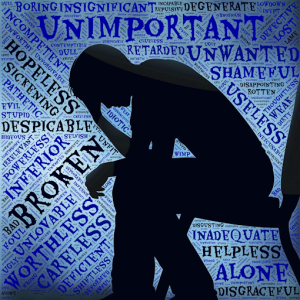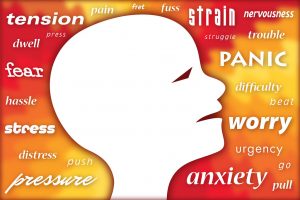16 Coping with Mental Illness
Andjela Calic; Garet Haugebak; Spencer Ponce; and Sergio Lopez
College students are faced with multiple obstacles they must overcome when it comes to mental illness. Mental illnesses or mental disorders often change and impact one’s mood, behavior, and thinking processes on a daily basis. Some of the most common illnesses affecting college students include depression, anxiety, ADHD, and many different kinds of eating disorders. All of these illnesses are treatable, can be diagnosed by a medical professional, and include accessible help through multiple platforms. Someone suffering from these illnesses can obtain guidance and relief through therapeutic counseling, medication, and even by talking to a good friend.
Depression
What is it?
Depression can come in many different forms. This is especially true for teenagers and people in their early twenties. Research has shown that people in those age ranges are 16% more likely to get depression than any other age group. You may ask how depression impacts college students? In fact, the majority of college students are in that age range making it more likely for depression to occur. Also since the majority of college students are locked away in their rooms doing schoolwork or at work trying to afford college. They are more likely to become lonely and distant which is a big factor leading to depression. How does one know they have depression? Well, you can either self-diagnose by viewing your mood and day and comparing it to symptoms or you can see a therapist or doctor.

Common Symptoms of depression:
- Loss of interest in activities you once enjoyed
- Extreme weight loss or weight gain
- Trouble sleeping
- Thoughts of Death or Suicide
- Feeling worthless
- Feeling a loss of energy
- Isolation
What are some ways to get help with depression?
-There is the 24/7 suicide hotline which is a number to call when one is feeling depressed or suicidal where people will talk to you and guide you on what to do. The number is 800-273-8255.
-On campus at PVCC one can go to the college police for direct help. Also if it is an emergency you can call them at 480-784-0911 or non-emergency at 602-787-7900.
– Going to see a therapist can help by talking through your depression and trying to find the source.
– If you are looking for a medicine route to a fix there are many different forms of anti-depressant medications. In order to get a prescription one must see a psychiatrist and for follow-ups to make sure the dosage is correct.
Anxiety
What is it?
Anxiety is the body’s response to stress and stress-related experiences. Fortunately, anxiety is something that’s experienced by everyone in their lifetimes. For many people, the sentiments of worry come and go, but for others, it may last weeks, months, and even years, thus affecting day-to-day life and activities. When these feelings of anxiousness begin to interfere with daily life, it is possible that there’s an anxiety disorder involved. When feeling anxious, the body goes on high alert and activates the flight or fight response which is also accompanied by feelings of fear or dread about what’s to come. Other symptoms include restlessness, increased heart rate, difficulty falling and staying asleep, and more. Not all people experience anxiety and its symptoms identically, therefore it’s important to understand the numerous different symptoms.

What are the common symptoms?
The symptoms of anxiety are not limited to restlessness, increased heart rate, difficulty falling, and staying asleep. Symptoms also include:
- Rapid breathing
- Increased heavy sweating
- Trembling or muscle twitching
- Difficulty focusing on things other than what is causing the worry
- A strong desire to avoid things that can spark feelings of anxiousness
- Performing certain behaviors repeatedly
- Anxiety surrounding a particular life event in the past (also indicative in PTSD)
- Digestive issues
Why are students faced with anxiety? What are the types of anxiety disorders?
Anxiety is prevalent in college students for multiple reasons. Students in college are in the process of a major life transition. Not to mention the stress the academic environment instills and the difficulties of juggling extracurricular activities, having a part-time or full-time job, and managing large amounts of coursework. Despite these realities, doctors don’t have a complete understanding of what causes anxiety disorders. Currently, it is believed that anxiety is caused due to traumatic past experiences, genetics, and underlying health issues. There are several forms of anxiety disorders; these include, but are not limited to:
- Agoraphobia, which is a fear of places that makes an individual feel trapped or powerless.
- Generalized anxiety disorder, where one experiences constant worry even during ordinary activities. This is also accompanied by physical symptoms such as headaches.
- Obsessive-Compulsive disorder, which is the continual experience of unwanted or intrusive thoughts and worries that cause anxiety.
- Post-traumatic stress disorder, which occurs after an individual experiences a traumatic life event. Symptoms include trouble sleeping, disturbing dreams, and flashbacks of the event.
How is anxiety treated?
If you or someone you know is struggling with anxiety and believe that help is needed, it’s best to visit a psychologist to be diagnosed with the condition. If it is severe, it may need to be treated with medication that can be obtained through a psychiatrist. If medication isn’t required anxiety can be treated with talk therapy alone. Sometimes it’s tough to find the right therapist, but you’ll know they’re right for you if you feel comfortable discussing your anxiety with them. If therapy is not an option, there are at-home treatments and other coping mechanisms for this disorder. The Anxiety and Depression Association of America (ADAA) provides a directory of support groups for individuals battling with anxiety and other mental health issues. The Mayo Clinic Anxiety Disorders page provides helpful tips for coping with anxiety, such as discovering possible triggers of stress, and learning how to manage your time wisely.
ADHD
Attention deficit hyperactivity disorder or commonly referred to as ADHD is a neurodevelopmental disorder where individuals act impulsively and find it hard to focus and complete tasks. Individuals may also find difficulty “fitting in” when it comes to social situations. This is usually due to a lack of patience or always being in a constant state of motion.
Types of ADHD
There are only three types of ADHD and they are as follows:
- Predominantly inattentive (ADHD-PI or ADHD-I).
- Characterized as being easily distracted and having trouble focusing on tasks.
- Predominantly hyperactive-impulsive (ADHD-PH or ADHD-HI).
- Characterized as talking nonstop and fidgeting while also being impatient. Oftentimes interrupt and have a lack of social understanding when it comes to social cues and non-verbal communication.
- Combined type (ADHD-C).
- Characterized as having both (ADHD-PI) and (ADHD-PH).
ADHD In Students
About half of adolescents with ADHD have some history of social rejection compared to roughly 10-15% of adolescents who don’t have ADHD. Having trouble with social skills can make it hard for people with ADHD to ask for help when it comes to school as they often fall behind because they cannot pay attention. Students with ADHD also are at an increased risk to abuse substances such as alcohol and cannabis. With this increased rate of substance abuse getting treatment becomes even more difficult.
Causes and Symptoms
Even though ADHD is one of the most studied and diagnosed mental disorders in adolescents there is no concrete evidence stating what causes it. It is believed that genetics plays a key role in having ADHD though as most children who have it inherit it from their parents. It is also theorized that social factors and environment play key roles in developing ADHD as well. As for symptoms, the most common ones are
- Difficulty paying close attention.
- Trouble focusing and completing tasks.
- Shortened attention span and very easily distracted.
- Difficulty with structured skill work such as studying and lectures.
- Inability to sit still or wait.
Treatment
As for getting help with ADHD, there are many options. Counseling is seen is the less controversial option as totally removing the negative outcomes of ADHD is almost impossible. Medication is also used as a treatment in conjunction with counseling or by themselves. Some common types of medication for ADHD are; stimulants, atomoxetine, and even antidepressants
Eating Disorders
Eating disorders are a form of mental illness where one forms an unhealthy relationship with food and eating behaviors, whether that means too much or too little. Eating disorders affect all people, regardless of age, gender, ethnicity, orientation, or any other defining category. Eating disorders can be typically seen through one’s infatuation with food and food consumption or obsessing over body weights, shapes, and sizes. Fortunately, despite eating disorders being so common and affecting anyone, they are treatable.

Common Eating Disorders
Although there are many kinds of eating disorders, there are a few that are seen most frequently. They consist of:
- Anorexia nervosa – Consists of one severely restricting their diet, constantly exercising and even using laxatives or vomiting in an effort to lose weight. They typically always see themselves as overweight.
- Bulimia nervosa – typically involves one eating large quantities of food, only to feel guilt over these binge-eating episodes. As a result, one quickly tries to get rid of the food through excessive use of laxatives or vomiting, or any other method to try and compensate for the food consumption.
- Binge-eating disorder – Extremely common, especially in the U.S. Involves long periods of overeating followed by lack of exercise to balance out the food consumption. Usually leads to obesity.
Causes and Symptoms
Eating disorders can be caused by a majority of factors, most notably psychological and biological factors. Eating disorders can stem from outside influences, such as societal pressures, typically leading to depression and anxiety. However, they can also be passed down genetically, and are typically found to run in families.
Treatment
While eating disorders can stem from, or cause other mental illnesses such as anxiety and depression, they are completely treatable. Some common forms of treatment include psychotherapy, medications, medical care/monitoring, and nutritional counseling.
In conclusion, mental Illnesses are quite serious and can affect others in a variety of different ways, such as the few described above. Whether that be shown in one’s behavior, actions, or day to day life experiences, mental illnesses can cause drastic effects to those affected by them. While this may seem daunting, it is important to know that many others face similar situations, and treatment is readily available. Regardless of the mental illness, one may face, such as depression, anxiety, ADHD, or eating disorders, treatment is easy to find, and available to all.
Community Resources
Paradise Valley Community College resource page with mental health websites:
https://www.paradisevalley.edu/students/counseling/mental-health-websites
The Anxiety and Depression Association of America (ADAA) provides a directory of various support groups for individuals battling with anxiety and other mental health issues, such as depression and eating disorders.
The Mayo Clinic Anxiety Disorders page provides helpful tips for coping with anxiety, such as discovering possible triggers of stress, and learning how to manage time wisely. The site also shows various treatment options for each anxiety disorder, and what one can expect to hear from their doctor.
The Mayo Clinic Eating Disorder Treatment Options page provides helpful treatment options, and information for those looking for different ways and options to manage eating disorders such as bulimia, anorexia, binge-eating disorder, or any other eating disorder.
The National Suicide Hotline can be reached at the number 800-273-8255, has workers readily available twenty-four hours a day, seven days a week. These workers are available to anybody who needs somebody to talk to when contemplating suicide, or just needing assistance.
PVCC Campus Police can help regarding any issues one may face on the Paradise Valley Community College campus. The emergency number is 480-784-0911, and the non-emergency number is 602-787-7900.
Media Attributions
- SILHOUETTE OF DEPRESSED MAN © Long Pyles is licensed under a Public Domain license
- Stress and Anxiety © JoanDragonfly is licensed under a CC BY-SA (Attribution ShareAlike) license
- Scared © Solene Gochard is licensed under a CC BY (Attribution) license

